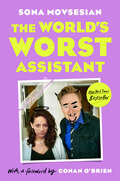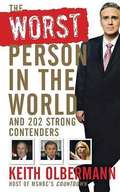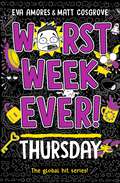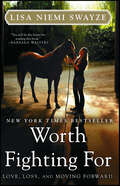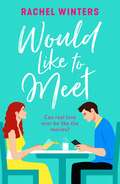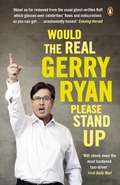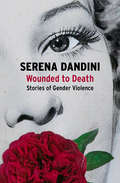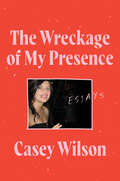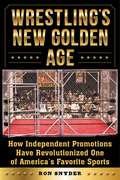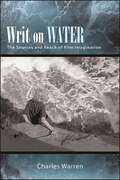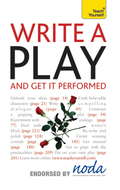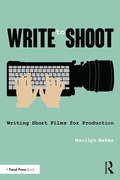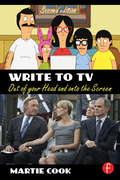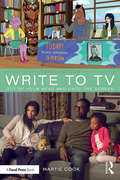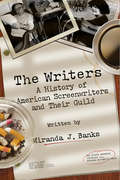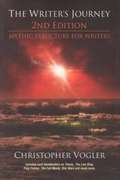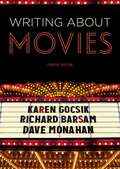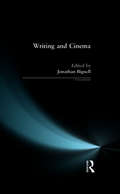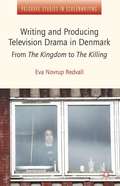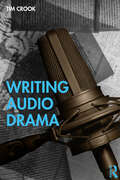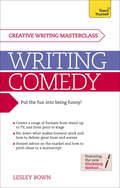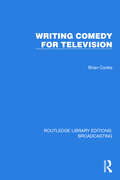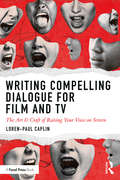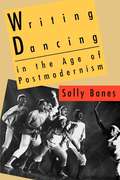- Table View
- List View
The World's Worst Assistant
by Sona MovsesianFrom Conan O&’Brien&’s longtime assistant and cohost of his podcast, Conan O'Brien Needs a Friend, a completely hilarious and irreverent how-to guide for becoming a terrible, yet unfireable employee, spilling her trade secrets for minimizing effort while maximizing the rewards. Sona Movsesian didn&’t wake up one day and decide to become the World&’s Worst Assistant. Achieving such greatness is a gradual process--one that starts with long hours and hard work before it eventually descends into sneaking low-dosage edibles into your lunch and napping on your boss&’s couch. With a forward from Conan O&’Brien, The World&’s Worst Assistant is populated with hysterical black-and-white illustrations, comics, and more. It&’s a mixture of how-tos (like How to Nap at Work and How to Watch TV at Your Desk), tips for becoming untouchable (like memorizing social security and credit card numbers and endearing yourself to friends and family), and incredible personal stories from Sona&’s twelve years spent working for Conan that put their adorable closeness and professional dysfunction on display. In these pages, Sona will explain her descent from eager, hard-working, ambitious, detail-orientated assistant to self-awarded title-holder for the worst in history. This book is irresistible fun you&’ll want to give to every young professional in your life. For readers of heartfelt humor like that of Phoebe Robinson and Colin Jost, The World&’s Worst Assistant is a chance for fans, viewers, and listeners of Conan&’s shows and podcast to fall in love with Sona and Conan all over again.
The Worst Person in the World: And 202 Strong Contenders
by Keith OlbermannThe stinkers, the rascals, the reprobates ... and the just plain dumb. (Yes, Bill, he's talking about you.) Geraldo Rivera. The Coca-Cola Company. Victoria Gotti. Tom Cruise. Various members of the Bush administration. All have earned the dishonor of "Worst Person in the World," awarded by MSNBC's witty and controversial reporter Keith Olbermann on his nightly MSNBC show Countdown with Keith Olbermann. Now, he brings all his bronze, silver, and gold medalists together in this wildly entertaining collection that reveals just how twisted people can be--and how much fun it is to call them out on it. From tongue-in-cheek observations to truly horrific accounts, Olbermann skewers both the mighty and the meek, the well-known and the anonymous for their misdeeds, including: Ann Coulter, for, among other things, calling Muslims "ragheads" in a speech to the Conservative Political Action Conference in Washington; Barbara Bush, for making a generous donation to the Hurricane Katrina Relief Fund earmarked exclusively for the purchase of computer software ... software sold by her son, Neil; The staff of Your World with Neil Cavuto, for the story about the murders of Iraqi civilians that was accompanied by the on-screen graphic: "All-out Civil War in Iraq: Could It Be a Good Thing?". Olbermann also reports on some of the recent fallout from his awards, such as the controversy with John Gibson and the mysterious disappearance of remarks about Cindy Sheehan on Rush Limbaugh's Web site. Plus, he reveals the winner of the most coveted award of all: "Worst in Show."
Worst Week Ever! Thursday (Worst Week Ever! #4)
by Eva Amores Matt CosgroveHave YOU ever had a bad week? The hilarious new series taking the world by storm. He&’s dressed up like a clown on national TV, his worst enemy is stealing the limelight, and there's definitely something weird happening with everyone's cats! Justin Chase is having the WORST WEEK EVER! At least he's found a new BFF in international pop sensation, teen heartthrob and Justin&’s name twin, Justin Chase, right? Maybe not... As a case of mistaken identity leads to a disastrous kidnapping and Justin forced to race against the clock (and the ferocious dog) to escape! Monday was mortifying, Tuesday was tumultuous, Wednesday was wild, but now it's... THURSDAY! The fourth book in the hilarious new seven-part highly-illustrated series for fans of Tom Gates, Diary of a Wimpy Kid and the Treehouse series.
Worth Fighting For: Love, Loss, and Moving Forward
by Lisa Niemi SwayzeFrom Patrick Swayze’s widow—the moving, New York Times bestselling account of grief, loss, caregiving, and moving on, with touching stories from their final months together.When Lisa Niemi first exchanged vows with Patrick Swayze, she promised to be with her husband “till death do us part.” But how many couples stop and think about what that truly means? Worth Fighting For is both a candid tribute to a marriage and a celebration of the healing power that each day holds, even in the most difficult of circumstances. Lisa shares the details of Patrick’s twenty-one-month battle with Stage IV pancreatic cancer, and she describes his last days, when she simply tried to keep him comfortable. She writes with heartbreaking honesty about her grief in the aftermath of his death and openly discusses the challenges that the years without him have posed. Her story is an emotionally honest and unflinching depiction of loss, but it is also a hopeful and life-affirming exploration of the power of the human spirit. “I tell you, I am a different person now,” she writes, “one who has been thrown into the fire and forged.”
Would Like to Meet: The perfect uplifting romance, with love, laughter and hope for 2021
by Rachel Winters'A great romcom which made me laugh and cry.' Kate, 5 stars Long-suffering assistant Evie Summers will lose her job unless she can convince her film agency's biggest and most difficult client, Ezra Chester, to finish the script for a Hollywood romcom. The catch? He hasn't started writing it. Suffering from 'writer's block,' he will only put pen to paper if singleton Evie can prove to him that you can fall in love like they do in the movies. Forget internet dating, Evie can only meet a man the way that Sally met Harry, or Hugh Grant meets anyone. Cue her entering into one ridiculous romcom scenario after another. But can life ever be like the movies?Of course, real life is never that straightforward . . .Perfect for fans of Beth O'Leary's The Flatshare, Jojo Moyes and Sophie Kinsella. Would Like to Meet is a love story for hopeless romantics everywhere.
Would The Real Gerry Ryan Please Stand Up
by Gerry RyanGerry Ryan on life, the world, the universe - and a few things besides. Here are his experiences, stories and opinions drawn from nearly thirty years of talking to the nation. It's a sharp, punchy read all told in his no-nonsense, irreverent, straight to the bone style. It's the best, the worst, the funniest, the most outrageous. And threaded through it's the story of coming of age as a broadcaster at the same time as Ireland became a truly modern country. A smart, sassy and wildly entertaining read.
Wounded to Death
by Serena DandiniThe voices too many women have lost; the dreams too many men have destroyed In these monologues originally written for theatrical performance, women who were victims of murder regain their voices to tell their truths. One woman, her body unceremoniously dumped in a well by her husband, laments the police force's halfhearted investigation of her murder. Another, forced to toil ceaselessly for a meager few euros per month, grows weary of enduring daily beatings and attempted rape and hangs herself from a crystal chandelier. Inspired by true events, these monologues represent what the victims of femicide might say, had they not been robbed of their voices. First staged as a play in 2012 in Palermo, Italy, Wounded to Death has taken Italy and the world by storm. Alongside the powerfully imagined speeches in this edition, Serena Dandini presents the grim global statistics of violence against women. This essential book showcases the author's exceptional capacity for creating nuanced emotion, from comic to painful, from grotesque to dramatic. With a factual basis and cinematic flair, these works compel the reader to consider the violence that is taking place right now all over the world.
The Wreckage of My Presence: Essays
by Casey WilsonLaugh-out-loud, deeply insightful, and emotion-filled essays from multitalented actress, comedian, podcaster, and writer Casey Wilson. <P><P>Casey Wilson has a lot on her mind and she isn’t afraid to share. In this dazzling collection, each essay skillfully constructed and brimming with emotion, she shares her thoughts on the joys and vagaries of modern-day womanhood and motherhood, introduces the not-quite-typical family that made her who she is, and persuasively argues that lowbrow pop culture is the perfect lens through which to examine human nature. <P><P>Whether she’s extolling the virtues of eating in bed, processing the humiliation over her father’s late in life perm, mourning her mother's passing, or revealing her patented method for keeping the mystery alive in a marriage, Casey is witty, candid, and full of poignant and funny surprises. Humorous dives into her obsessions and areas of personal expertise—self-help, nice guys, cool girls (not her) and how to receive visitors in the bath—are matched by touching meditations on female friendship, anger, grief, motherhood, and identity. <P><P>Reading The Wreckage of My Presence is like spending time with a close friend—a deeply passionate, full-tilt, joyous, excessive, compulsive, shameless, hungry-for-it-all, loyal, cheerleading friend. A friend who is ready for any big feelings that come her way—and isn’t afraid to embrace them. <P><P><b>A New York Times Bestseller</b>
Wrestling's New Golden Age: How Independent Promotions Have Revolutionized One of America?s Favorite Sports
by Ron SnyderEver since the "Monday Night Wars,” where WWE and WCW battled for wrestling supremacy (with the WWE coming out on top), there was now only one game in town. If fans wanted to watch wrestling, it was WWE or bust. That is no longer the case.Wrestling’s New Golden Age is both a historical look at the sport, while showing how everything has finally come full circle. Going back to the past, the sport was originally territory-based, with wrestlers traveling across the country from promotion to promotion. From the East coast (Jim Crockett, WWWF) down to Texas (World Class) and all the way up to Canada (Stampede), wrestling was run on an individual level. But once Vince McMahon Jr. came into the picture, that all changed.While the territory system is long gone, indie wrestling is bigger than ever. Whether it’s ROH, CZW, NXT, NJPW, or any of the other numerous promotions, wrestling has a new face. With information spreading online through social media and video streaming, fans are able to watch wrestling on a consistent basis, as opposed to only when the WWE is on TV. They not only have more options, but are able to watch wrestlers travel up the ranks to the "big show.” Now when a wrestler from the indie’s makes his WWE appearance, he already has a gimmick, a storyline, and a faithful fanbase. As can be seen with CM Punk, Daniel Bryan, and many others, the independent promotions are the new face of professional wrestling.Featuring interviews with wresting stars, including Jake Roberts, Jim Ross, Rob Van Dam, Matt Hardy, Tommy Dreamer, and numerous others, Wrestling’s New Golden Age shares how the wrestling world has finally come full circle, to the joy of fans across the globe.
Writ on Water: The Sources and Reach of Film Imagination (SUNY series, Horizons of Cinema)
by Charles WarrenThis eloquent book draws on the author's responses to a wide range of extraordinary films—"long takes" on Altman's Nashville, Godard's Hail Mary, Makavejev's WR: Mysteries of the Organism, and von Sternberg's Blonde Venus, as well as "short takes" on films by Jean Rouch, Chris Marker, Chantal Akerman, Ross McElwee, Michelangelo Antonioni, Michael Haneke, and Jean-Pierre and Luc Dardenne. Charles Warren's masterful close readings blend profound philosophical reflections with a treasure trove of literary and artistic references to place film, in its relations to other arts, as one of the greatest aesthetic forms. Collectively, these essays offer an original and powerful statement on the nature of film and the intimate relation of what the author calls "film imagination" to our lives as human beings in the world. This important and much-needed book is no less than a celebration and affirmation of the very discipline of film criticism. One is left with one's appetite for film refreshed.
Write A Play - And Get It Performed: Teach Yourself
by Lesley Bown Ann GawthorpeWrite a Play - and Get It Performed is designed for would-be writers of every level and for all types of motivation by two prize-winning professionals. Whether writing for the specific needs of an amateur drama group, community event, political campaign or simply for personal or professional development, this is a guide to the craft of playwriting. It offers guidance on the creative principles of scripts, characters, plot, structure and dialogue and explains the principles of staging and stage directions as well as gives tips on how to write for a variety of different situations, for every age and ability and according to specific genres - particularly those often preferred by amateur groups, such as pantomime and musical theatre. NOT GOT MUCH TIME? One, five and ten-minute introductions to key principles to get you started. AUTHOR INSIGHTS Lots of instant help with common problems and quick tips for success, based on the author's many years of experience. TEST YOURSELF Tests in the book and online to keep track of your progress. EXTEND YOUR KNOWLEDGE Extra online articles at www.teachyourself.com to give you a richer understanding of writing a play. FIVE THINGS TO REMEMBER Quick refreshers to help you remember the key facts. TRY THIS Innovative exercises illustrate what you've learnt and how to use it.
Write A Play And Get It Performed: Teach Yourself
by Lesley Bown Lesley Hudswell Ann GawthorpeWrite a Play - and Get It Performed is designed for would-be writers of every level and for all types of motivation by two prize-winning professionals. Whether writing for the specific needs of an amateur drama group, community event, political campaign or simply for personal or professional development, this is a guide to the craft of playwriting. It offers guidance on the creative principles of scripts, characters, plot, structure and dialogue and explains the principles of staging and stage directions as well as gives tips on how to write for a variety of different situations, for every age and ability and according to specific genres - particularly those often preferred by amateur groups, such as pantomime and musical theatre.NOT GOT MUCH TIME?One, five and ten-minute introductions to key principles to get you started.AUTHOR INSIGHTSLots of instant help with common problems and quick tips for success, based on the author's many years of experience.TEST YOURSELFTests in the book and online to keep track of your progress.EXTEND YOUR KNOWLEDGEExtra online articles at www.teachyourself.com to give you a richer understanding of writing a play.FIVE THINGS TO REMEMBERQuick refreshers to help you remember the key facts.TRY THISInnovative exercises illustrate what you've learnt and how to use it.
Write to Shoot: Writing Short Films for Production
by Marilyn BekerWrite to Shoot teaches budding screenwriters and screenwriting filmmakers how to write a short script with production in mind. Beker instructs them how to showcase their strengths, tailor projects to shoestring budgets, resources, and practical production parameters without sacrificing the quality and punch of their screenplays, whether they're creating a sizzle short for an unproduced feature script, an independent creative work, or a soapbox to promote a cause. Write to Shoot: Writing Short Films for Production is a must-have guide for anyone who wants to be sure there will be no surprises on set that come from a script that's not ready for production.
Write to TV: Out of Your Head and onto the Screen
by Martie CookLearn to craft smart, original stories and scripts for a variety of television formats and genres, including comedy, drama, pilots, animation, made-for-TV movies, late night, and reality television. Hear directly from studio and network executives, agents, and managers on what they're looking for in new writers and how to avoid common pitfalls. Gain access to sample outlines, script pages, checklists, and countless other invaluable resources that will help you break into the industry and put you on the path to immediate success. In Write to TV, Second Edition industry veteran Martie Cook offers practical advice on writing innovative television scripts that will allow you to finally get that big idea out of your head and onto the screen. This new edition has been updated to include: Tips and techniques from industry vets Jay Leno, Norman Lear, Paul Haggis, David Magee, Susan Rovner, Tal Rabinowitz, Jonathan Littman, Peter Jankowski, Steve Stark, and Doug Herzog that you can immediately apply to your own projects Expanded coverage of writing pilots, pitching, writing webisodes, writing for tweens, writing for late night, and rewriting Useful advice for navigating the confusing television hierarchy, including how to network, get an agent, land that first writing job, and even "do lunch" 25 new interviews with writers and producers of hit shows such as New Girl, Parks and Recreation, The Blacklist, Curb Your Enthusiasm, CSI, The Tonight Show Starring Jimmy Fallon, and many more An all new companion website (www.writetotv.com) featuring blog updates, industry trends, a Q&A discussion forum with the author, and many other resources
Write to TV: Out of Your Head and onto the Screen
by Martie CookIn Write to TV (third edition) industry veteran Martie Cook offers practical advice on writing innovative television scripts that will allow you to finally get that big idea out of your head and onto the screen. With this book you’ll learn to craft smart, original stories and scripts for a variety of television formats and genres, including comedy, drama, pilots, web series, and subscription video on demand. This new edition has been updated with expanded coverage on writing for global audiences, content creation for streaming services such as Netflix, Amazon and Hulu, as well as writing the web series, podcasts and utilizing free platforms such as YouTube. It also features new chapters on writing for niche markets; breaking into the writers’ room; creating binge-worthy series and how to accompany pilot scripts with a series pitch document. Plus, expanded information on creating complex and compelling characters including writing anti-heroes and strong female protagonists and much, much more. Including information directly from studio and network executives, agents, and managers on what they’re looking for in new writers and how to avoid common pitfalls, advice from successful creators and showrunners on creating original content that sells, and tips from new writers on how to get into a writers room and stay there. This book contains information from more than 20 new interviews, access to sample outlines, script pages, checklists, and countless other invaluable resources, and is the ideal book for anyone who wants to break into the TV writing industry.
The Writers
by Miranda J. BanksScreenwriters are storytellers and dream builders. They forge new worlds and beings, bringing them to life through storylines and idiosyncratic details. Yet up until now, no one has told the story of these creative and indispensable artists. The Writers is the only comprehensive qualitative analysis of the history of writers and writing in the film, television, and streaming media industries in America. Featuring in-depth interviews with over fifty writers--including Mel Brooks, Norman Lear, Carl Reiner, and Frank Pierson--The Writers delivers a compelling, behind-the-scenes look at the role and rights of writers in Hollywood and New York over the past century. Granted unprecedented access to the archives of the Writers Guild Foundation, Miranda J. Banks also mines over 100 never-before-published oral histories with legends such as Nora Ephron and Ring Lardner Jr., whose insight and humor provide a window onto the enduring priorities, policies, and practices of the Writers Guild.With an ear for the language of storytellers, Banks deftly analyzes watershed moments in the industry: the advent of sound, World War II, the blacklist, ascension of television, the American New Wave, the rise and fall of VHS and DVD, and the boom of streaming media. The Writers spans historical and contemporary moments, and draws upon American cultural history, film and television scholarship and the passionate politics of labor and management. Published on the sixtieth anniversary of the formation of the Writers Guild of America, this book tells the story of the triumphs and struggles of these vociferous and contentious hero-makers.
The Writer's Journey, Second Edition: Mythic Structure for Writers
by Christopher VoglerThe Writer's Journey sets forth archetypes common in what Vogler calls "the hero's journey," the mythic structure that he claims all stories follow. In the book's first section, he lists the different kinds of typological characters who appear in stories. In the second, he discusses the stages of the journey through which the hero generally passes. The final, supplementary portion of the book explains in detail how films like Titanic and The Full Monty follow the patterns he has outlined.
Writing About Movies (Fourth Edition)
by Karen Gocsik Dave Monahan Richard BarsamWriting About Movies offers students two books in one: a handy guide to the process of academic writing and a brief but thorough introduction to the basics of film form, film theory, and film analysis. Written by the director of the Warren College Writing Program at University of California, San Diego, and the authors of the leading introductory film studies text, Writing About Movies is the only writing guide a student of film will need.
Writing and Cinema (Crosscurrents)
by Jonathan BignellThis collection of essays examines the ways in which writing and cinema can be studied in relation to each other. A wide range of material is presented, from essays which look at particular films, including The Piano and The English Patient, to discussions of the latest developments in film studies including psychoanalytic film theory and the cultural study of film audiences. Specific topics that the essays address also include: the kinds of writing produced for the cinema industry, advertising, film adaptations of written texts and theatre plays from nineteenth century 'classic' novels to recent cyberpunk science fiction such as Blade Runner and Starship Troopers. The essays deal with existing areas of debate, like questions of authorship and audience, and also break new ground, for example in proposing approaches to the study of writing on the cinema screen. The book includes a select bibliography, and a documents section gives details of a range of films for further study.
Writing and Producing Television Drama in Denmark
by Eva Novrup RedvallOffering unique insights into the writing and production of television drama series such as The Killing and Borgen, produced by DR, the Danish Broadcasting Corporation, Novrup Redvall explores the creative collaborations in writers' rooms and 'production hotels' through detailed case studies of Denmark's public service production culture.
Writing Audio Drama
by Tim CrookWriting Audio Drama is a comprehensive and intelligent guide to writing sound drama for broadcasting and online production. The book uses new and original research on the history of writing radio plays in the UK and USA to explore how this has informed and developed the art form for more than 100 years. Audio drama in the context of podcasting is now experiencing a global and exponential expansion. Through analysis of examples of past and present writing, the author explains how to originate and craft drama which can explore deeply psychological and intimate themes and achieve emotional, truthful, entertaining, and thought-provoking impact. Practical analysis of the key factors required to write successful audio drama is covered in chapters focusing on audio play beginnings and openings, sound story dialogue, sustaining the sound story, plotting for sound drama and the best ways of ending audio plays. Each chapter is supported by extensive companion online resources expanding and supporting the writers and subjects discussed and explored, and extensive information on how to access online many exemplar and model sound dramas referenced in the chapters. This textbook will be an important resource for undergraduate and postgraduate students taking modules and courses on radio drama, theatre and media drama, audio theatre, audio drama, scriptwriting, media writing.
Writing Comedy: How to use funny plots and characters, wordplay and humour in your creative writing
by Lesley BownLearn how to write comedy that makes people laugh.Masterclass: Writing Comedy will reveal to both beginners and experienced writers the distinctive features that mark out comedy from other forms of creative writing. Having identified these, it will help you then to unlock your inner anarchist, and explore the different elements of comedy, using a combination of practical exercises, insight and creative inspiration. Whatever your preferred comic genre, you will find guidance on everything from wordplay and visual humour to plots, comedy characters and different styles.A section on performance will help you to hone stand-up skills, while chapters on stage and screen will give techniques and tips on how to craft a sitcom or create a sketch show. Finally, there is a uniquely frank but useful section on the realities of the markets, and the actualities of going it alone with self-publishing and self-promotion - or the tools you need to successfully pitch an idea or comic manuscript.ABOUT THE SERIESThe Teach Yourself Creative Writing series helps aspiring authors tell their stories. Covering a range of genres from science fiction and romantic novels to illustrated children's books and comedy, this series is packed with advice, exercises, and tips for unlocking creativity and improving your writing. And because we know how daunting the blank page can be, we set up the Just Write online community, at tyjustwrite.com, for budding authors and successful writers to connect and share.
Writing Comedy for Television (Routledge Library Editions: Broadcasting #40)
by Brian CookeWriting Comedy for Television (1983) is a practical, step-by-step manual about how and what to write. It contains many examples from the scripts of various sitcoms and sketch shows. It demonstrates how to construct a storyline for a series, how to lay out a sketch, who to pitch to, and how a television comedy is put together.
Writing Compelling Dialogue for Film and TV: The Art & Craft of Raising Your Voice on Screen
by Loren-Paul CaplinWriting Compelling Dialogue for Film and TV is a practical guide that provides you, the screenwriter, with a clear set of exercises, tools, and methods to raise your ability to hear and discern conversation at a more complex level, in turn allowing you to create better, more nuanced, complex and compelling dialogue. The process of understanding dialogue writing begins with increasing writers’ awareness of what they hear. This book provides writers with an assortment of dialogue and language tools, techniques, and exercises and teaches them how to perceive and understand the function, intent and thematic/psychological elements that dialogue can convey about character, tone, and story. Text, subtext, voice, conflict, exposition, rhythm and style are among the many aspects covered. This book reminds us of the sheer joy of great dialogue and will change and enhance the way writers hear, listen to, and write dialogue, and along the way aid the writers’ confidence in their own voice allowing them to become more proficient writers of dialogue. Written by veteran screenwriter, playwright, and screenwriting professor Loren-Paul Caplin, Writing Compelling Dialogue is an invaluable writing tool for any aspiring screenwriter who wants to improve their ability to write dialogue for film and television, as well as students, professionals, and educators.
Writing Dancing in the Age of Postmodernism
by Sally BanesDrawing of the postmodern perspective and concerns that informed her groundbreaking Terpsichore in Sneakers, Sally Banes's Writing Dancing documents the background and developments of avant-garde and popular dance, analyzing individual artists, performances, and entire dance movements. With a sure grasp of shifting cultural dynamics, Banes shows how postmodern dance is integrally connected to other oppositional, often marginalized strands of dance culture, and considers how certain kinds of dance move from the margins to the mainstream.Banes begins by considering the act of dance criticism itself, exploring its modes, methods, and underlying assumptions, and examining the work of other critics. She traces the development of contemporary dance from the early work of such influential figures as Merce Cunningham and George Balanchine to such contemporary choreographers as Molissa Fenley, Karole Armitage, and Michael Clark. She analyzes the contributions of the Judson Dance Theatre and the Workers' Dance League, the emergence of Latin postmodern dance in New York, and the impact of black jazz in Russia. In addition, Banes explores such untraditional performance modes as breakdancing and the "drunk dancing" of Fred Astaire.Ebook Edition Note: Ebook edition note: All images have been redacted.
